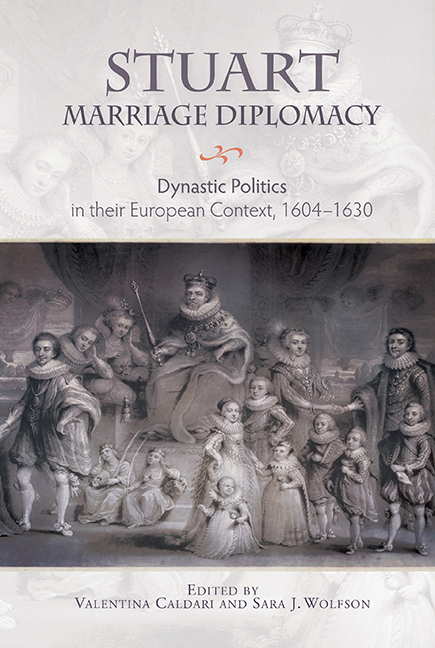Book contents
- Frontmatter
- Contents
- List of Illustrations
- List of Contributors
- Acknowledgements
- List of Abbreviations
- Introduction
- Part One Marriage and the Court
- Part Two Marriage and Politics
- Part Three Marriage and War
- Part Four Marriage and News
- Part Five Marriage and Continental Europe
- Part Six Marriage and Ceremony
- Bibliography
- Index
- Studies in Early Modern Cultural, Political and Social History
Introduction
Published online by Cambridge University Press: 24 October 2019
- Frontmatter
- Contents
- List of Illustrations
- List of Contributors
- Acknowledgements
- List of Abbreviations
- Introduction
- Part One Marriage and the Court
- Part Two Marriage and Politics
- Part Three Marriage and War
- Part Four Marriage and News
- Part Five Marriage and Continental Europe
- Part Six Marriage and Ceremony
- Bibliography
- Index
- Studies in Early Modern Cultural, Political and Social History
Summary
Dynastic marriages mattered in post-Reformation Europe as indeed they had before and would do so long afterwards. Of itself, this is not exactly a new insight. Any book that revisits this topic risks being thought to have reinvented the wheel. At the same time, the business of dynastic negotiation between early modern European princely states looks in many ways so thoroughly un-modern that there is still a risk that scholars, so often on the lookout for the origins of modernity, might choose to ignore what made this topic central to early modern politics.
With this in mind, this volume combines cultural definitions of politics with a wider exploration of institutional, military, diplomatic and economic concerns in order to provide a more comprehensive understanding of the Stuart court's dynastic marriage negotiations. It covers the period from the signing of the Treaty of London in 1604 until the conclusion of the Anglo- French and Anglo-Spanish peace treaties (1629–30). In doing so, it explores dynastic politics over three decades, and investigates how the search for a bride for Princes Henry and Charles started a long process of protracted consultations between several European states: Spain, France, various Italian kingdoms including, as an arbiter, the papacy, and also Brussels and the United Provinces. The often seemingly endless series of to-and-fro talks lays out for us the overlapping agendas of the relevant courts and the interplay of an array of dynastic, geopolitical, military and religious concerns.
The aim of this volume is to look at this not only from a British but also from a European and global angle. Of course, James I had taken the English crown because of his dynastic rights as Elizabeth's successor, established by earlier Tudor–Stuart marriages. But the dynastic future of the senior Stuart line was unlikely to be restricted by the borders of the British Isles. Indeed, two of the essays in Part Two, by Edmond Smith and Kelsey Flynn, assess respectively the East and the Atlantic to demonstrate how extra-European connections led to the promotion of new ways to regulate domestic and foreign policy. These, for the first time, measured losses and gains in terms of non-European dominions.
- Type
- Chapter
- Information
- Stuart Marriage DiplomacyDynastic Politics in their European Context, 1604–1630, pp. 1 - 10Publisher: Boydell & BrewerPrint publication year: 2018



